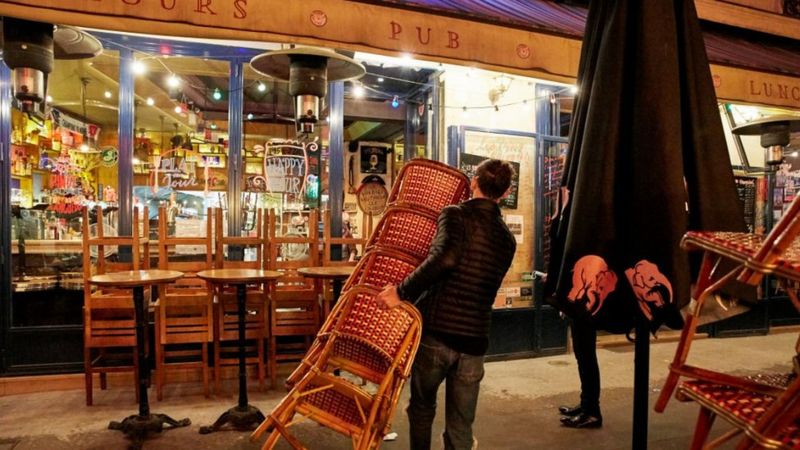The French government is imposing a curfew on two-thirds of the country – 46 million people – from Friday night for six weeks, after a record 41,622 new coronavirus infections in one day.
Written content by BBC.
The total infected in the epidemic has now passed one million. In Europe, only Spain and Russia have reached that.
A week ago night curfews were introduced in Paris and eight other French cities. Now 38 more areas will have curfews from 21:00 to 06:00.
Most of Europe has rising infections.
Slovakia is to impose a partial lockdown for a week from Saturday, allowing only travel to work, shopping for essentials and school for younger children.
New lockdowns have come into force in the Czech Republic and Republic of Ireland.
There are also high infection rates in Belgium, Spain and Italy, putting many hospitals under severe pressure.
Italy’s Lazio and Campania regions begin night curfews on Friday, a day after one took effect in Lombardy in the north.
French crisis deepens
The wider French curfew comes into effect at midnight (22:00 GMT) on Friday, then at 21:00 from Saturday onwards.
It has drawn complaints from restaurant and bar owners, whose businesses are already suffering after the two-month lockdown in the spring.
In several regions of France, more than half the intensive care beds are now occupied by Covid-19 patients. Over the past 24 hours France recorded 162 more deaths.

A new French app called “#TousAntiCovid” has been launched, to replace the previous one “#StopCovid” that was downloaded by only 2.7 million people – far below the take-up of similar anti-Covid apps in the UK and Germany.
#TousAntiCovid is a smartphone tracing tool with more local information than the previous app.
French Prime Minister Jean Castex said “circulation of the virus has today reached a very high level” – 251 infections per 100,000 people in the past week.
He said that was a 40% increase in one week and the reproduction (R) rate was around 1.35, “which basically means a doubling of the number of cases every two weeks”. The R rate measures how many others each infected person is passing the virus on to. Read more from BBC.
Follow News Without Politics for more interesting and amazing, important, and relevant U.S. and world news stories plus health, entertainment, sports, weather, food and more without media bias.
Stay informed daily. News fair and balanced, ahead of influence.




